
Settling in on the streets: Six months on, Division of Community Care finding niche in Northampton
NORTHAMPTON — In September, the city launched an experiment to try to create an alternative to police responses to address issues of mental health, homelessness and social inequities in the city.The Division of Community Care, which opened its doors...

Democracy’s defense marches on: Constitutional lawyer, activist daughter highlight annual Law Day event
NORTHAMPTON — Raised into activism and grassroots organizing, Marisol Pierce Bonifaz cites two key events that, for her, served as calls to action: U.S. Sen. Dianne Feinstein’s dismissive response to youth activists pushing for the Green New Deal, and...
Most Read
 A Waterfront revival: Two years after buying closed tavern, Holyoke couple set to open new event venue
A Waterfront revival: Two years after buying closed tavern, Holyoke couple set to open new event venue
 Services being held Thursday for Greenfield homicide victim
Services being held Thursday for Greenfield homicide victim
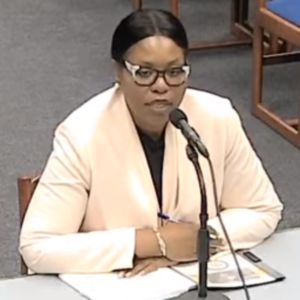 Island superintendent picked to lead Amherst-Pelham region schools
Island superintendent picked to lead Amherst-Pelham region schools
 Area property deed transfers, May 2
Area property deed transfers, May 2
 Granby Bow and Gun Club says stray bullets that hit homes in Belchertown did not come from its range
Granby Bow and Gun Club says stray bullets that hit homes in Belchertown did not come from its range
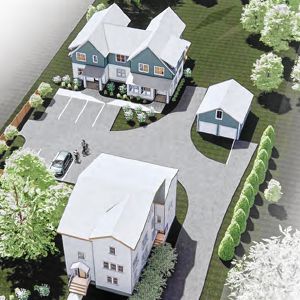 3-unit, 10-bed house in backyard called too much for Amherst historic district
3-unit, 10-bed house in backyard called too much for Amherst historic district
Editors Picks
 A Look Back, May 3
A Look Back, May 3
 Easthampton author Emily Nagoski has done the research: It’s OK to love your body
Easthampton author Emily Nagoski has done the research: It’s OK to love your body
 Earth Matters: Honoring a local hero: After 40 years, Hitchcock Center bids farewell to educator and creative leader, Colleen Kelley
Earth Matters: Honoring a local hero: After 40 years, Hitchcock Center bids farewell to educator and creative leader, Colleen Kelley
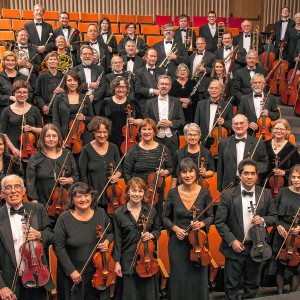 The Beat Goes On: A trombone celebration in Holyoke, Lord Russ shifts gears, and the Hampshire Young People’s Chorus turns 25
The Beat Goes On: A trombone celebration in Holyoke, Lord Russ shifts gears, and the Hampshire Young People’s Chorus turns 25
Sports

UMass lacrosse: Top-seeded Minutewomen hold off St. Joseph’s, punch A-10 title-game ticket
The top-seeded UMass women’s lacrosse team advanced to the Atlantic 10 Tournament championship game with a 10-9 win over No. 4 St. Joseph’s on Friday afternoon in Pittsburgh, Pa.The Minutewomen will look to re-claim the Atlantic 10 Tournament title on...
 Ultimate: Amherst Invitational returns to UMass this weekend
Ultimate: Amherst Invitational returns to UMass this weekend
 2024 Gazette Wrestler of the Year: Adin Clifford, Hampshire
2024 Gazette Wrestler of the Year: Adin Clifford, Hampshire
Opinion

My Turn: Gaza and lies
Say, “I don’t believe the numbers.” Insist “It’s complicated.”Say, “There is no alternative. Hamas has called for the destruction of the state of Israel and thus, Hamas must be destroyed.” Disregard the Israeli leaders who have called for the...
 Guest columnist Mariel E. Addis: Pride and prejudice
Guest columnist Mariel E. Addis: Pride and prejudice
 Guest columnist Gene Stamell: We know what we know
Guest columnist Gene Stamell: We know what we know
 Jennifer Dieringer: Budget must serve whole city
Jennifer Dieringer: Budget must serve whole city
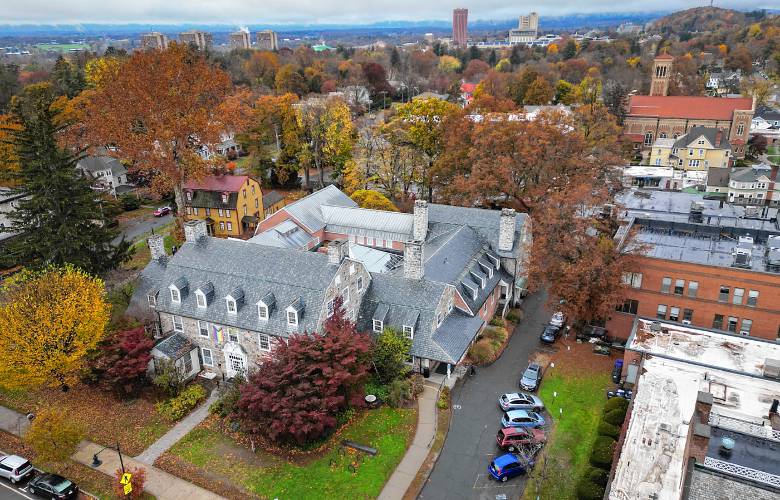 Ken Rosenthal: Time to change direction on Jones Library
Ken Rosenthal: Time to change direction on Jones Library

Business

Area property deed transfers, May 2
AMHERST Faheem Ibrahim Lt and Faheem Ibrahim to Nan Zhao and Zhihong Ni, 16 Arbor Way, $738,000 Richard B. Spurgin to Yg Pleasant LLC, East Pleasant Street, Lot 1, $218,000 Richard B. Spurgin to Yg Pleasant LLC, East Pleasant Street, Lot 2,...
Arts & Life

Valley Bounty: Delivering local food onto students’ plates: Marty’s Local connects farms to businesses
Nick Martinelli, CEO of Marty’s Local, began his career with a stint at the Farm School in Athol, hoping to learn how he might participate in the local agricultural economy. While conducting market research in 2015, he recognized there was a lot of...
Obituaries
 Eli Knapp Abrams
Eli Knapp Abrams
Florence, MA - Eli Knapp Abrams, of Florence Massachusetts, passed away suddenly on Monday, April 22nd, 2024 in Goshen, MA. Eli was born in Beverly, MA on March 19th, 2003. He is the cherished son of Jennifer and Maury Abrams, and belov... remainder of obit for Eli Knapp Abrams
 Lorna Areda Kepes
Lorna Areda Kepes
Pelham, MA - Lorna Areda (Hinton) Kepes, 78, of Pelham, passed away peacefully in her home on Tuesday April 30, 2024, surrounded by her loving family. She was born in Manchester, England on November 18, 1945, to the late George and Vict... remainder of obit for Lorna Areda Kepes
 Andre Nolet
Andre Nolet
Holyoke, MA - Holyoke- Andre E. Nolet, a resident of Holyoke, passed away at home on April 28, 2024 at the age of 74. One of six children to the late J. Leo Nolet and Rose (Roy) Harker, Andre was born in Holyoke on October 6, 1949. He a... remainder of obit for Andre Nolet
 Marion Shea
Marion Shea
(1919 - 2024) NORTHAMPTON, MA - Marion Catherine (Osepowicz) Shea, of Northampton passed away at her home peacefully with family members and support by the nurses from the Hospice of the Fisher Home, Amherst, Massachusetts on Saturday, ... remainder of obit for Marion Shea

 State legislative panel spurns ballot measures
State legislative panel spurns ballot measures
 Holyoke Police Chief Pratt retiring: ‘It’s time to go’
Holyoke Police Chief Pratt retiring: ‘It’s time to go’
 Valley writers shine in initial round of Mass Book Award competition: 12 area authors and author/illustrators long-listed for 2024 awards
Valley writers shine in initial round of Mass Book Award competition: 12 area authors and author/illustrators long-listed for 2024 awards
 Hadley Town Meeting OKs battery storage bylaw, honor Chunglo for service
Hadley Town Meeting OKs battery storage bylaw, honor Chunglo for service
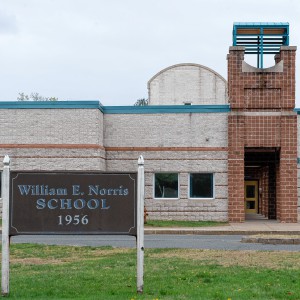 Southampton Town Meeting on Tuesday to weigh land buy for safety complex
Southampton Town Meeting on Tuesday to weigh land buy for safety complex
 Select board race between Gilmore, Shores Ness tops Deerfield ballot on Monday
Select board race between Gilmore, Shores Ness tops Deerfield ballot on Monday
 Around Amherst: Primary schools piloting foundational reading program
Around Amherst: Primary schools piloting foundational reading program
 1989 homicide victim found in Warwick ID’d through genetic testing, but some mysteries remain
1989 homicide victim found in Warwick ID’d through genetic testing, but some mysteries remain
 Debt-burdened students, grads rally for relief
Debt-burdened students, grads rally for relief
 Softball: Hopkins Academy making strides despite 8-3 loss to Franklin Tech (PHOTOS)
Softball: Hopkins Academy making strides despite 8-3 loss to Franklin Tech (PHOTOS) On The Run with John Stifler: A closer look at the Boston Marathon’s wheelchair division
On The Run with John Stifler: A closer look at the Boston Marathon’s wheelchair division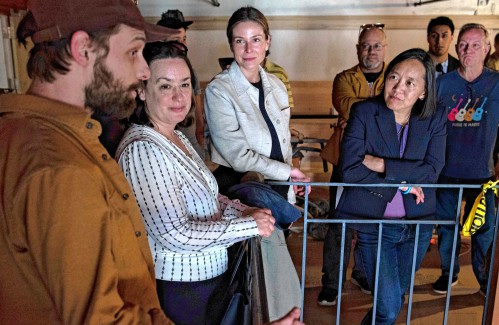 Music key to Northampton’s downtown revival: State’s top economic development leader tours city
Music key to Northampton’s downtown revival: State’s top economic development leader tours city  Locking up carbon for good: Easthampton inventor’s CO2 removal system turns biomass into biochar
Locking up carbon for good: Easthampton inventor’s CO2 removal system turns biomass into biochar Advancing water treatment: UMass startup Elateq Inc. wins state grant to deploy new technology
Advancing water treatment: UMass startup Elateq Inc. wins state grant to deploy new technology New Realtor Association CEO looks to work collaboratively to maximize housing options
New Realtor Association CEO looks to work collaboratively to maximize housing options Let’s Talk Relationships: Breaking up is hard to do: These tools can help it feel easier
Let’s Talk Relationships: Breaking up is hard to do: These tools can help it feel easier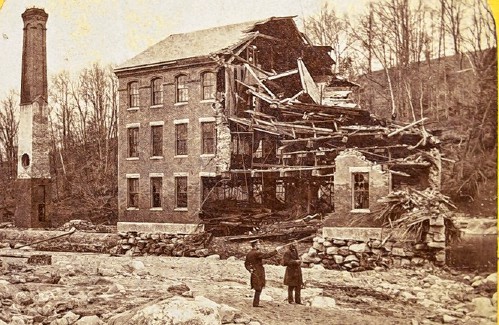 The long shadow of the Mill River flood: Multiple events on tap in May to mark 150th anniversary of the 1874 disaster
The long shadow of the Mill River flood: Multiple events on tap in May to mark 150th anniversary of the 1874 disaster 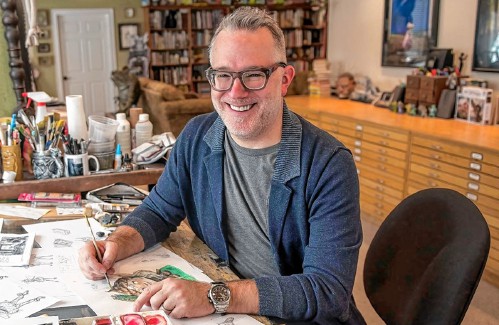 Fantasy favorite revisited: Amherst authors’ popular ‘Spiderwick Chronicles’ gets a new streaming adaptation
Fantasy favorite revisited: Amherst authors’ popular ‘Spiderwick Chronicles’ gets a new streaming adaptation Speaking of Nature: Bird of my dreams, it’s you: Spotting a White-tailed Tropicbird on our cruise in Bermuda
Speaking of Nature: Bird of my dreams, it’s you: Spotting a White-tailed Tropicbird on our cruise in Bermuda
